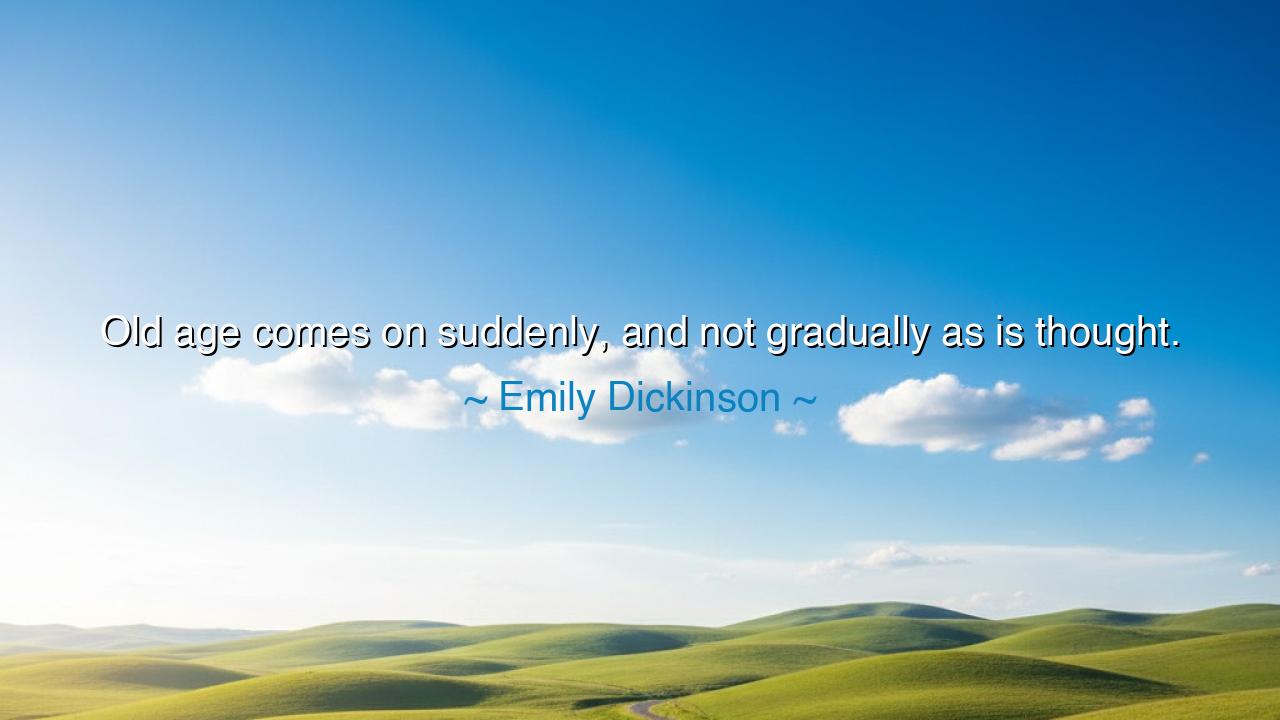
Old age comes on suddenly, and not gradually as is thought.






"Old age comes on suddenly, and not gradually as is thought." These words from Emily Dickinson reflect the surprising and often jarring nature of the passage from youth and middle age to the later years of life. It is a profound observation about the nature of time—how it moves silently, almost imperceptibly, and then, in an instant, we are confronted by the stark reality of aging. We are often led to believe that old age creeps up on us slowly, a distant future that we have time to prepare for. But in truth, it is not the slow, gradual shift we anticipate; it is a sudden awakening, a realization that one day, without warning, the vigor of youth fades, and the reality of age becomes undeniable.
In youth, we are filled with energy, and the days feel long and endless, as though we can accomplish everything before us. In middle age, we are often busy, managing responsibilities, and it seems we have time yet to achieve and experience more. But then, one day, we look into the mirror, or we are struck by a fleeting moment, and the signs of old age appear suddenly. It is as if the years, having quietly passed us by, have now caught up in an instant. A loss of strength, a change in appearance, or a moment of forgetfulness can feel like the abrupt onset of old age, as if time, once a gentle current, has now swept us to a new place without warning.
Consider the story of Alexander the Great, whose meteoric rise to power was as swift and unstoppable as his empire. Yet, in the prime of his youth, at the age of 32, he fell ill and died, leaving behind a life of extraordinary achievement, but a life that ended much sooner than anyone could have imagined. Old age, for Alexander, was not a gradual process. He had barely reached the fullness of his strength and ambition when he was overtaken by the unforeseen and sudden end of his life. His death exemplifies that age does not always come in the expected form, and sometimes, it arrives suddenly, leaving no time for preparation. This realization echoes Dickinson's words that old age is not something that unfolds slowly but can strike unexpectedly when we are least prepared.
Queen Elizabeth I, though she reigned over England with strength and vitality, found herself faced with the sudden realities of aging toward the end of her life. The once vigorous monarch, who led England through the Spanish Armada and into the Elizabethan Golden Age, began to show signs of age with increasing rapidity in her later years. Her health deteriorated suddenly, and despite her immense strength of character, the ravages of time overtook her, leaving her frail and increasingly isolated. The suddenness of Elizabeth’s aging speaks to the truth in Dickinson's quote: no matter how powerful or mighty one might seem in their prime, old age is a shift that can come swiftly, unexpectedly, and without warning.
Dickinson's insight also reminds us of the emotional side of aging. In youth, we often take the future for granted, thinking we have more time to make choices, pursue dreams, and live without considering the finite nature of life. But then, without warning, we realize that we have crossed a threshold. We may suddenly find ourselves alone, reflecting on the years gone by, with the realization that the future we had imagined has already slipped past us. Old age can feel like a sudden shift in perspective—a world that once felt full of possibility now seems smaller, more limited. But it is not merely the physical decline that surprises us; it is the emotional weight that comes with the passing of time, the reckoning that we did not fully appreciate the fleeting nature of the years.
Yet, the lesson in Dickinson’s words is not one of despair, but a call to live fully while we can. Just as old age arrives suddenly, so too can we make our mark on the world suddenly, through the choices we make and the way we spend our days. The key is to seize the present, to make every moment count, for we do not know when the sudden arrival of old age will catch us. Purpose must not be postponed until later years, but must be embraced and cultivated now, in the prime of our lives. Youth is a fleeting gift, but the ability to live meaningfully is something that can be nurtured at any stage of life.
Therefore, let us not wait for the suddenness of old age to find us unprepared. Let us instead embrace the impermanence of time and live with intention, cultivating habits that bring us purpose, joy, and connection each day. Let us remember that old age may come upon us unexpectedly, but it is how we live in the years leading up to it that shapes how we face its inevitable arrival. Live fully, love deeply, and make the most of every moment, for we never know when time will shift, and we will find ourselves on the other side of life’s great threshold. Let us, like the ancient heroes, strive to live with honor and purpose, knowing that though old age may come suddenly, it is the life we lead that will carry us through.






AAdministratorAdministrator
Welcome, honored guests. Please leave a comment, we will respond soon